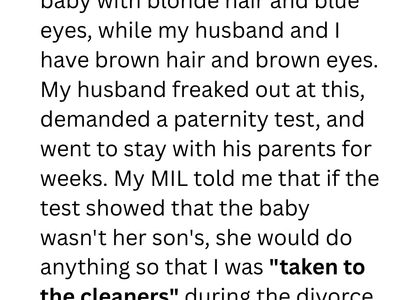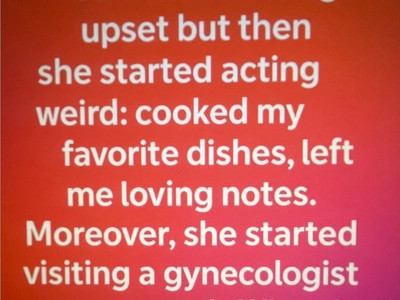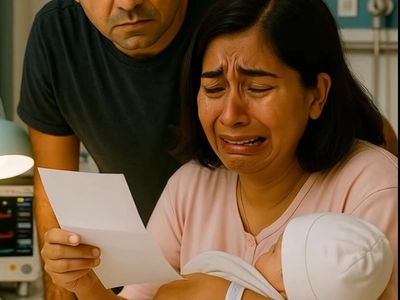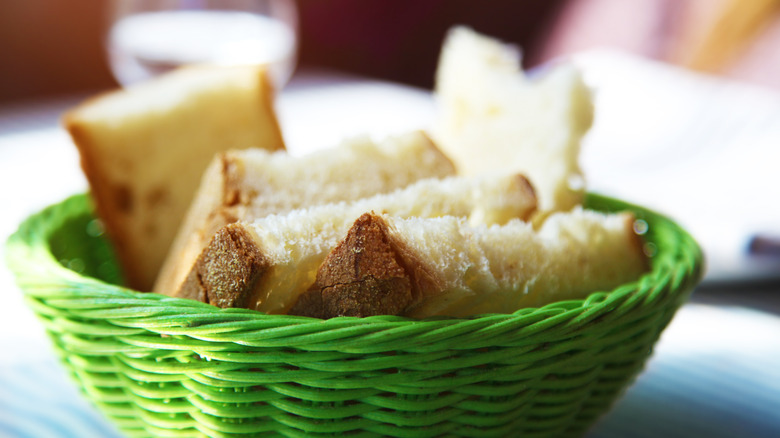When a DNA Test Proved More Than Biology – It Restored Our Family’s Trust
When our daughter was born, I thought the room would be filled with nothing but joy — happy tears, laughter, and love. I had pictured that moment so many times, imagining my husband holding her for the first time, both of us overwhelmed by the miracle we had created together. But instead of the pure happiness I had dreamed of, that day turned into the most painful experience of my life.
She was perfect — a tiny bundle with soft blonde hair and striking blue eyes. I remember staring at her in awe, feeling an instant wave of love so powerful it made me tremble. My husband stood beside me, quiet at first, then his smile began to fade. His brow furrowed slightly, and I could almost see the thoughts forming behind his eyes. His silence stretched too long. I reached for his hand, expecting him to share in my wonder, but instead, he pulled it away gently, as though unsure what to say.
We both have dark hair and brown eyes. So when our baby’s fair features appeared, it was surprising — but to me, it was just another sign of how beautiful and unpredictable life can be. To him, it was something else. I didn’t realize it at the time, but that first moment planted a seed of doubt in his mind that would soon grow into something far more painful.
By the next morning, his warmth had disappeared. He spoke less, avoided eye contact, and kept his distance from both me and the baby. When I asked what was wrong, he gave short, vague answers. I could tell something was eating at him, but I didn’t know how to reach him. It wasn’t until the third day, when he suddenly announced he needed to “figure things out,” that I realized how deep his doubts had gone.
He left that afternoon, saying he was going to stay with his parents for a while. I stood there in the hospital room, still sore and exhausted, holding our tiny daughter against my chest, trying to understand what had just happened. The joy I had imagined for so long — the warmth, the love, the support — had vanished before it even began.
When we finally returned home, I was alone. My husband barely answered my calls, and when he did, his tone was sharp and distant. Then came the message that shattered what little peace I had left: he wanted a paternity test.
I sat on the couch, clutching my sleeping baby, feeling as though the air had been knocked out of me. I knew I hadn’t done anything wrong, but his lack of trust felt like a wound that cut straight to my heart.
His mother didn’t make things easier. She called me once, her voice cold and full of contempt. “If that test proves the baby isn’t his,” she said slowly, “I will make sure you pay the price for what you’ve done.”
I didn’t respond. There was nothing I could say to someone so convinced of my guilt. I hung up, tears running down my face, and looked at my daughter — her tiny fingers wrapped around mine, her chest rising and falling with every breath. She was innocent. She didn’t deserve any of this.
Those weeks were the hardest of my life. I woke up every few hours to feed and change her, too exhausted to think straight but unable to rest. The house was silent except for her cries and the hum of the refrigerator. I tried to focus on her — her little coos, the way her mouth curled when she dreamed — but every quiet moment gave my mind room to wander into the dark. What if he never came back? What if this doubt had already destroyed everything we had built together?
When the envelope with the test results finally arrived, I was shaking before I even opened it. He came to the house, his face pale, his hands trembling. His mother stood beside him, tight-lipped and tense. I held our daughter close, my heart pounding so hard I could barely breathe.
He opened the envelope slowly, pulling out the paper like it was something dangerous. I could see his eyes scanning the page, the words sinking in. And then his expression changed — first confusion, then disbelief, then something that looked like shame.
The test confirmed he was the father.
No one said a word. The silence in the room was so heavy it felt like the air itself might shatter. My husband’s hands started to shake. Tears welled up in his eyes and spilled down his cheeks. His mother’s face went pale as she took a step back, her earlier threats echoing in the back of my mind.
I didn’t scream. I didn’t yell. I didn’t even ask for an apology. I just looked down at my daughter, at her tiny face so full of innocence, and whispered softly, “It’s okay.” Because she was all that mattered. She didn’t need to feel the weight of anyone else’s mistakes.
For a long time after that day, things between us were fragile. My husband apologized over and over, his voice breaking each time. He told me he’d been terrified — not just of the possibility that she wasn’t his, but of losing the life we had together. He admitted his mother’s words had made everything worse, feeding his fear until it turned into something poisonous.
I wanted to forgive him, but forgiveness doesn’t come in an instant. It comes slowly, piece by piece, as trust begins to rebuild itself. We went to counseling, where we learned to talk openly about what had happened. He told me how ashamed he felt for doubting me, for walking away when I needed him most. I told him how lonely it was to face everything alone, how I cried each night after feeding our daughter, wishing he were there beside me.
One of the things that helped most was learning about genetics — how traits can skip generations and reappear unexpectedly. We found out that his grandmother had blonde hair and blue eyes, just like our daughter. It was something so simple, yet it carried so much weight. It reminded us that not everything can be explained by what we see in front of us. Sometimes, the past leaves quiet traces in our children — gifts we don’t recognize until we look closely.
Even after the science made everything clear, the emotional wounds took longer to heal. He worked hard to earn back my trust. Every night, he came home early from work to help with the baby — feeding her, changing her, rocking her to sleep. I could see how much he loved her, how deeply he regretted the time he had missed. Slowly, his presence began to feel steady again. The walls between us, once thick and cold, started to crumble.
There were moments when the pain returned — a sudden memory, a flash of anger, a feeling of betrayal that hadn’t fully faded. But then I would see him cradling our daughter, whispering softly to her as she drifted to sleep, and I would remember why I chose to keep fighting for us. Love isn’t perfect. It gets bruised, tested, and sometimes nearly broken. But when two people are willing to rebuild it, it can grow stronger than before.
Months passed, and the heaviness in our home began to lift. Laughter returned — first in small doses, then freely. The baby’s giggles filled the air like sunlight after a storm. One evening, my husband came home with flowers. He handed them to me awkwardly, almost shyly, and said, “I don’t deserve your forgiveness, but I’m thankful for it every day.” I smiled, realizing I didn’t need to hold onto the pain anymore. It had already taken enough from us.
My mother-in-law eventually changed too. She began visiting often, her tone softer, her eyes kinder. The first time she held our daughter after the truth came out, she cried quietly, kissing her forehead and whispering something I couldn’t hear. I saw genuine remorse in her face — a recognition that her harshness had nearly destroyed something beautiful. Over time, she began treating me with the respect she had never shown before. It wasn’t immediate, but it was real.
Now, years later, our daughter is a lively, curious little girl with that same golden hair and those bright blue eyes that once caused so much pain. Sometimes I watch her playing with her father, both of them laughing so hard they can barely breathe, and I feel something inside me heal a little more. He looks at her with so much love that it’s hard to remember there was ever doubt.
There’s one moment that always stays with me. One night, after putting her to bed, he turned to me and said quietly, “I almost missed all of this because I was afraid.” His voice broke slightly. “I’ll never let fear make me doubt you again.”
I nodded, not because I needed to hear the words, but because I knew he meant them. Fear had almost destroyed our family, but love — patient, forgiving love — had saved it.
What I’ve learned since then is that family isn’t defined by appearance or even blood. It’s built through trust, forgiveness, and the willingness to stand by each other even when everything feels uncertain. Sometimes, the people we love will fail us. They will doubt, they will falter, they will say things that cut deep. But when there’s genuine remorse and the courage to rebuild, love can survive almost anything.
Now, when I see my husband holding our daughter — her blue eyes staring up at him, his dark ones soft with love — I don’t think about the pain anymore. I think about how far we’ve come. I think about how love can bend without breaking, how trust can be rebuilt, and how forgiveness can turn even the deepest wounds into something healing.
Our daughter doesn’t know the story of those early days yet. To her, we are simply Mom and Dad — the people who tuck her in, who cheer for her, who make her laugh. Someday, when she’s old enough, maybe I’ll tell her how her arrival changed everything. How she taught us what love really means. How she showed us that family isn’t something you’re given — it’s something you fight for, every single day.
And when I do, I’ll tell her this: she came into the world carrying light, even when we couldn’t see it. She was never the cause of our pain — she was the reason we found our way back to love.






